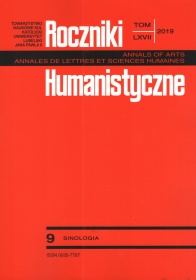Xiao Jing 孝經 – Early Meaning of Xiao 孝 and Translation of Text
Abstract
The paper contains translation of Confucian classical text Xiao Jing into Polish with analysis of early meaning of xiao, usually translated into English as a “filial piety.” Loving and caring for one parents while they are alive and offer sacrifices after their death is the core meaning of xiao. A person who learnt to obey and care for parents is able to extend that feeling to others outside the family. That makes xiao the root of ren — an exemplary behaviour towards all people. Hence learning how to behave in xiao way is first stage of Confucian self-developement. Traditionally ascribed to Confucius’ student Zengzi, Xiao Jing provides short but important insight into one of Confucian core ethical concepts.
References
Knapp, Keith N. 1995. „The Ru Reinterpretation of Xiao”. Early China 20: 195–222. JSTOR. Dostęp 28.12.2018. http://www.jstor.org/stable/23351767.
Läänemets, Märt. 1996. „The Conception of Filial Piety in Early Confucian Texts”. Religio. Revue pro Religionistiku, 4, issue 2: 139–148. Studie. Dostęp 30.04.2019. https://digilib.phil.muni.cz/bitstream/handle/11222.digilib/124763/2_Religio_4-1996-2_5.pdf?sequence=1.
Rudd, Herbert Finley. 1914. Chinese Moral Sentiments Before Confucius: A Study in the Origin of Ethical Valuations. Ph.D. Graduate Divinity School, 1914. CreateSpace Independent Publishing Platform, 2016.
Xu Quanxing i Huang Deyuan. 2008. „Theory on the Cultivation of Cognitive Subjects in Chinese Philosophy”. Frontiers of Philosophy in China 3, No. 1: 39–54. Dostęp 28.12.2018. https://www.jstor.org/stable/40343859.
Copyright (c) 2019 Roczniki Humanistyczne

This work is licensed under a Creative Commons Attribution-NonCommercial-NoDerivatives 4.0 International License.





